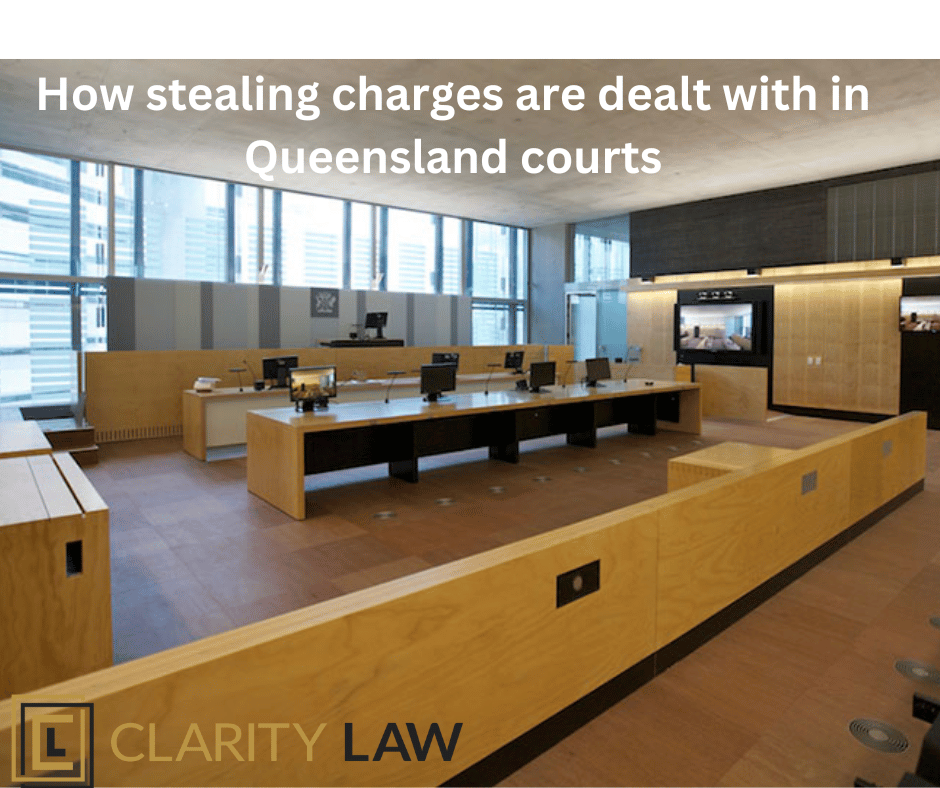
Our office has written in great detail about stealing offences here.
In short, a stealing offence occurs when a person has taken property (things capable of being stolen) with the intent to deprive the owner of the thing, to use as a security or used in a way that it cannot be returned in the condition it was in at the time of taking.
This article is not a detailed outline of the offence, but rather aims to give an outline about how a person could expect their stealing charge to progress through the court system where they intend to plea guilty. Your lawyer will review the matter and advise of any defences if they are available. If you are intending to challenge the charge then your matter will follow a different course than below.
This is not a substitute for tailored legal advice, but aims to clarify some of the uncertainty a person will experience.
Shoplifting –
Shoplifting – or unauthorised dealing with shop goods. This charge arises when a person has dishonestly taken or dealt with goods under a value of $150.00.
This is a matter that is dealt with in the Magistrate’s court and can usually be dealt with on the first occasion if the defendant intends to plea guilty to the charge.
The Court will take the defendants plea and then hear from the prosecution regarding the facts of the case. The Magistrate will then ask the defendant or their legal representative to say something about the defendant and give an explanation as to why the offence was committed.
The defendant will then stand and be sentenced. Given this is an offence against the Regulatory Offences Act, a defendant is liable to a fine of up to 6 penalty units.
How Stealing matters start
All stealing matters will start their life in the Magistrates Court, from there, depending on the seriousness of the offence or any circumstance of aggravation (such as if the value of the theft is over $30,000) the matter will then go through the process of committal and then indictment to the District Court.
Your will be required to attend court on the first mention in the Magistrates Court. You will be usually required to sign bail (see our article on bail here), then your lawyer will advise when you need to attend Court.
Stealing matters in the Magistrates Court
For the stealing matters that will remain in the Magistrates Court they will take one of two paths, either being dealt with in a short plea or where it will require a lengthy plea. The court will not typically hear a plea of guilty if the matter will take longer than 15 minutes in an arrest court (this could be Court 1 in the Southport or Beenleigh Magistrates Courts or Court 2 in the Holland Park Magistrates Court. This will depend on the practice directions of each specific court).
How long a stealing matter will take will depend on a number of factors, namely:
- the number of offences;
- the seriousness of the offending;
- the criminal history of the defendant; and/or
- a combination of all the above factors.
If the matter will be dealt with in 15 minutes or less, the matter can usually be dealt with either on the first mention or adjourned to another date for sentence in order to obtain material in mitigation of the sentence.
Short plea - A stealing matter will follow the same procedure as all Magistrates Court matters. The Magistrate will ask the defendant to stand and then read out the charge(s) and ask how the defendant pleas. The Magistrate may ask if the plea is of their own free will and/or if they have been promised anything or induced to make the plea.
The Police Prosecutor will then read the facts of the charge and may make a submission with respect of penalty.
Your lawyer will then stand and make submissions to the Court on your behalf, tendering any character references or other supporting material as necessary. Your lawyer will submit on penalty then the Magistrate will require you to stand and deliver the sentence.
A short plea can be dealt with as quickly as the first appearance date or adjourned to allow for the defendant to prepare material for their sentence. It is the quickest way to resolve a stealing offence.
Lengthy plea – A lengthy plea will follow the same procedure as a short plea, however the difference arises from the detail that will be given by both the prosecution and the defence.
The Police Prosecutor in a lengthy plea are more likely to make more detailed sentencing submissions than they would in a short plea. The prosecutor may tender comparative cases and have a more detailed back and forth with the Court.
Your defence lawyer will also make more in depth submissions to the Court regarding penalty and may provide case comparatives.
The Court may be more interactive with each of the parties, asking questions during submissions which may lead to lengthy discussions regarding the facts and how they compare to any tendered comparative cases.
The matter will then follow the same procedure for sentencing as a short plea.
This matter will usually not be heard on the first court appearance and will require adjournment to a specific date on which the court hears lengthy pleas. Courts have a backlog of lengthy pleas, so this may take a few weeks to progress to sentence date.
Matters that must be heard in the District Court
If your matter is to be heard in the District Court, you will be advised very early in the life of the matter. Your lawyer will identify if the matter must go up and will explain the process to you.
Very simply, the matter must be committed from the Magistrates Court to the District Court, where it will then be presented to the District Court on indictment. The Director of Public Prosecutions will take carriage of the matter once it goes up, and they have by law, 6 months to present the indictment. The upshot here is that a matter in the District Court can take a considerable amount of time to be dealt with.
Once the administrative process has occurred between your lawyer, the Court and the DPP it will come time for sentence. The District Court has a much more formal process to it than the Magistrates Court.
Depending on the seriousness of the offence, your lawyer will typically raise the discussion of engaging a Barrister (you might hear them also be called counsel) to do the sentence. Barristers are experts in District Court sentences and work closely with your lawyer in preparation for the sentence.
Once the sentence day comes around, your lawyer will explain exactly what will happen. In short, you will be required to be in the dock, which is the separate area for the defendant. The Judge’s associate will ask you to stand and read out the charges and ask you to enter your plea. As an example of the increased formality, the Associate will then read out your plea back to the Judge directly behind them. The Associate will then advise you that you have been convicted on your own plea and then ask if there is any reason sentence should not be passed on you. It is at that time you will sit down and the Prosecution will commence their case.
The Prosecution will read into the record the agreed facts of the case and then make their submissions with respect to penalty, relying on case comparatives to support their submission.
Your Barrister or Lawyer will then stand and make their own submissions about your background, the circumstances of the offending and provide their own case comparatives in support of the desired penalty.
This will follow a similar process as a Magistrates Court lengthy plea, just with additional formality and detail to correspond with the increased seriousness of the offence. Much like a lengthy plea, there may be some discussion between the Judge, the DPP and your lawyer/barrister during the process. This is normal and to be expected.
You will then stand and the Judge will read out your sentence. The Judge may adjourn the Court for a short time to consider what sentence they will pass.
Case Conferencing
During the course of your matter, you might hear your lawyer mention or talk about the case conferencing process. This is the process in which your lawyer will negotiate with the police prosecutor or the DPP.
The scope of the negotiation can be something as simple as negotiating the agreed facts of the case, or can include a written submission as to reducing or completely dropping some or all of the charges. This is an in depth process that takes some time to occur as it requires a detailed analysis and drafting of a legal argument to be sent to the prosecution and for their office to consider it.
Why get a lawyer
It should be clear from both our detailed article on stealing and the above, that a stealing charge can be a very complex and lengthy process to navigate. Engaging us gives you the best chance at obtaining the lowest penalty or avoiding a jail sentence if this is not your first offence. We are one of the leading criminal law firms in South East Queensland. We appear every week in the courts with people charged with stealing, it is this experience that allows us to get the best result for clients. Other law firms simply don’t have the experience that we do and don’t know the judges like we do. Just some of the benefits of us acting for you include;
- we know the judges and what they want to hear to give you the best outcome
- we have good relationships with the prosecutors meaning we can often have them not seek a jail sentence
- we are there to help you through the process and make everything as stress free as possible, in most cases you will not have to say anything in court
- engaging us shows the court you are taking your charges seriously
- your matter will be heard early, often first, you do not have to wait for 20-30 other matters to be heard before you
- you will be fully informed of what is to happen in court and what this means for you after court
- unlike the police or the Judge, we are there to look after you, your privacy and your interests
If your matter is going to progress by a lengthy plea in the Magistrates Court or on indictment to the District Court you will be engaged with your lawyer for a not insignificant period of time. Clarity Law’s lawyers all pride themselves on ensuring that you truly understand what is happening with your matter, that you have confidence and know that we are acting in your best interest. That is the Clarity Law difference and our record reflects this approach.
If you want to engage us or just need further no obligation information or advice then you can either;
1. Use our contact form and we will contact you by email or phone at a time that suits you
2. Call us on 1300 952 255 seven days a week, 7am to 7pm
3. Book a time for us to call you
4. Email the firms founder This email address is being protected from spambots. You need JavaScript enabled to view it.
5. Send us a message on Facebook Messenger






